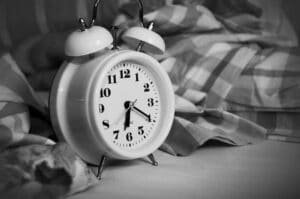The French sleep less and less: they sleep less than 7 hours per night, less than the recommended minimum duration (figure from Public Health France in 2019). However, sleep offers a multitude of benefits: not only does it allow the body to recover, but it also prevents ailments, physiological or psychological. Scientists are unanimous: too short nights often lead to weight gain and difficulty losing weight. Let's take a look at the importance of sleep for weight loss.
Au sommaire
ToggleSleep and weight loss: what does science say?

In 2009, American academics also looked at the role of sleep in weight gain. Further, their study showed that a lack of sleep creates a hormonal imbalance: small sleepers have a higher body mass index than large sleepers. There are several reasons for this: people who sleep little tend to snack due to a drop in their satiety hormone levels. For its part, the hunger hormone (ghrelin) is more secreted to stimulate appetite between meals. The same goes for cortisol, the stress hormone, which can see its level increase due to lack of sleep.
To avoid gaining weight, scientists recommend a light dinner and sticking to fixed habits (for example, dinerating every day at 7 p.m.), leaving a two-hour slot between the end of the meal and bedtime.
Other studies on sleep and weight loss
The scientific community has repeatedly pointed to the disastrous consequences of sleep problems on our silhouettes. Since the American and British studies on sleep deprivation and fat storage, many scientific teams have reported processes that link lack of sleep, behavioral changes and fluctuations in hormones essential in the regulation of our weight (insulin, ghrelin and leptin).
Behavioural causes

Changes in eating habits
Another study showed an increase in craving for snacking as well as the propensity for foods high in fats and sugars, observed after sleep deprivation. However, it is this change in eating behavior that leads to weight gain, by promoting the consumption of foods rich in unhealthy substances. These snacks are also outside the digestion cycles, which leads directly to the storage of food at the level of fat cells.
Fluctuations in weight-regulating hormones
Finally, scientists have also highlighted the consequence of lack of sleep on the concentration of hormones essential in the regulation of body weight. This is ghrelin, the hormone that stimulates appetite and promotes fat production, which leads to weight gain. For its part, the level of leptin, a hormone that inhibits appetite and stimulates energy expenditure, is greatly reduced. Thus, when one sleeps little, the concentration of these two hormones is unbalanced, which causes an increase in appetite, a reduction in physical activity, and thus leads to weight gain.
Sleeping in total darkness to burn more calories
Some health professionals suspect light pollution of hindering metabolic processes and calorie burning. Thus, if you sleep in a bright area, the best slimming advice is to place darkening curtains in your room in order to lose weight while sleeping. Indeed, your body must be in total darkness to secrete melatonin, a hormone that promotes a state of drowsiness and helps burn calories stored in fat cells.
See other slimming tips:
